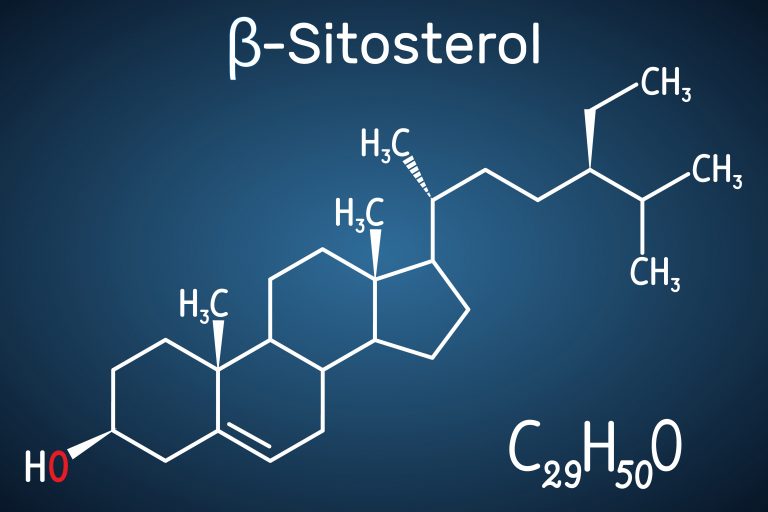Elevated blood cholesterol is not good. It contributes, for example, to myocardial infarction, atherosclerosis of blood vessels or coronary diseases. Phytosterols are an effective way to avoid these types of problems and to effectively lower cholesterol in the body. Their source is, among others vegetables, oils and nuts. How exactly do they work? How to use them properly? What doses will be the best? Phytosterols and cholesterol - what should we know?
Phytosterols
Cholesterol is produced by humans and animals. In turn, phytosterols - meaning plant sterols - can only be produced by plants. Their structure is very similar to the cholesterol design and helps in its reduction. They consist of two basic groups of sterols and stanols.
Sterols have only unsaturated bonds in the molecule, and stanols have a saturated bond. Their action is based on the inclusion of cholesterol in cell membranes. They manage cavities in its particles, at the same time strengthening the entire membrane. They have a vegetable origin, which is why they are most often supplied in food. Phytosterols began their first research in 1950, when it was noticed that their effect on high cholesterol was decreasing. They quickly found their application in health prophylaxis.
Phytosterols - occurrence
Plant sterols are found primarily in plant cells. Natural products mention below are their main source:
- vegetable oils, i.e. olive oil, sesame oil, corn oil or sunflower oil;
- rice bran;
- sesame, sunflower seeds;
- fruits and vegetables;
- wholegrain cereal products;
- almonds;
- leguminous vegetables, i.e. beans;
- nuts.
On the store shelves you can find many products enriched with plant sterols. Among them, yogurts, mayonnaise, ripening cheese, homogenized cheese, confectionery (chocolate), meat products or milk drinks are worth mentioning.

Phytosterols - dosage
Excess plant sterols bring certain side effects - it is worth paying attention to their amount in the diet. Every day a man consumes an average of 500mg stanol and sterols - this is not enough. Daily meals should provide from 1 to 3g of phytosterols. Such a dose will certainly have a positive effect on the functioning of the body.
How do phytosterols work?
How do phytosterols work? What effects do you bring? Can they also pose a threat to people?
The use of sterols has good sides.
- The main and most important effect of using phytosterols is the lowering of blood cholesterol. Sterols inhibit its absorption in the gastrointestinal tract, increasing its excretion from the body. A very small amount goes into the bloodstream.
- Plant sterols in the company of vitamins C and E inhibit platelet aggregation. So blocking the clumping of tiles, which by such clumping can lead to blockages in the circulatory system.
- Plant sterols have an antioxidant effect, i.e. they weaken free radicals in the body and through apoptosis, they cause cell death. Free radicals in the body cause degradation of the DNA molecule, which often contributes to the formation of tumors. These sterols retain, for example, lung, stomach and colon cancer. They also prevent metastases.
- They are often used in cosmetics because they can activate collagen. Thus, they improve skin tone and hydration, reduce wrinkles, accelerate skin regeneration and soothe numerous irritations.
- In the human body they act antifungal and antibacterial.
- They act anti-inflammatory, because they reduce the strong immune response. Thanks to this, they support and inhibit the development of diseases, i.e. rheumatological arthritis.
- Systematic consumption of plant sterols positively affects the prostate - reducing its hypertrophy and alleviating problems with passing urine.
Contradictions
In that case, can phytosterols pose any risk? It turns out that yes.
Their too high dose causes a bioavailability reduction of:
- β-carotene
- fat-soluble vitamins,
- lycopene.
Rinsing such important vitamins reduces immunity, which carries a greater risk of disease. Phytosterols should not be given to children, because at their young age their body needs cholesterol (as a building block).
Phytosterols and cholesterol
Plant sterols are a natural remedy for many diseases. The relationship phytosterols and cholesterol is very important - their main task is to lower the latter. However, they can also positively affect the skin, or strengthen other systems in the body. Do not exceed the daily dose, because excess amounts of valuable vitamins from the body. This in turn significantly affects the body's immunity. Adequate supply of phytosterols in the diet is certainly a better choice than a series of tablets and medicines.
Where to get phytosterols?
There is no problem with buying them - they are a component of many products that are on store shelves.






